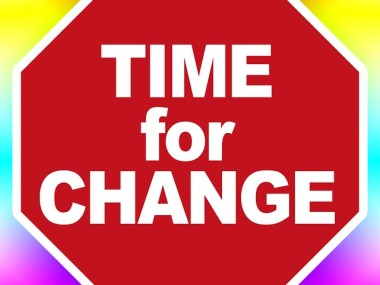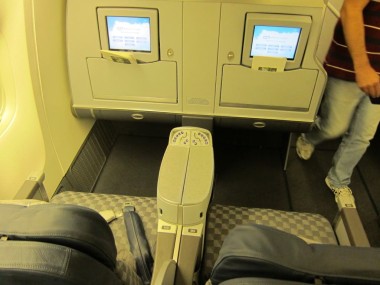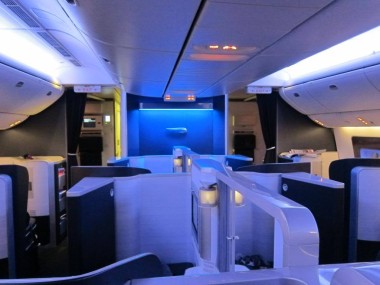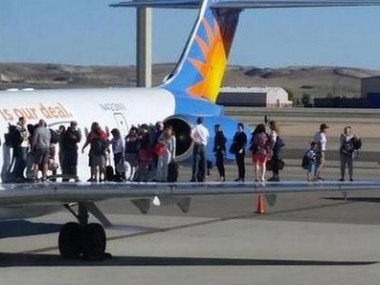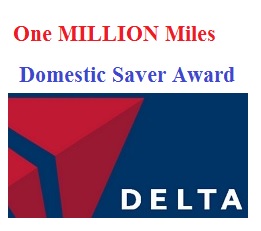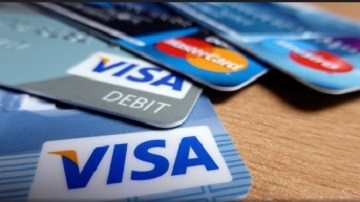A truly top quality time lapse YouTube video of the Dubai airport made from 88,000 shots that you can spin 360 degrees.
Monthly Archives
Monthly Archives for June 2015.
Why You Should Switch Airlines, Even If They’re About to Devalue (or De-hub)
A couple of comments I’ve heard over the past several days are worth addressing, because they represent ideas that make flyers worse off. And it’s flyers doing it to themselves.
The first is that — no matter how much better a program is — “I’m not going to switch because the other program will devalue too.”
Here’s the Inexpensive Flight Where American Will Let Everyone Confirm Upgrades at Booking for Free
American flies 3-cabin 777s sold as 2-cabin domestically. And right now anyone, even without elite status, can reserve those business class seats when buying an economy ticket at least on one important route.
When Members Get Under the Skin of Loyalty Program Fraud Teams
Earlier I wrote about loyalty program fraud discussions that take place at the major programs and how they often prioritize the wrong things and start out with a ‘blame the customer mindset’ even when it is against the interests of their own program.
But I don’t want to leave the impression that all members behave reasonably towards these programs and that it’s only hackers that loyalty executives ought to worry about.
Why Earning British Airways Status Makes No Sense (Even for Brits and NYLons)
British Airways has devalued their mileage in a major way. They’ve built a system that rewards paid full fare business and first class passengers who want to redeem their miles for short haul economy. They’ve made status harder to earn. And the truth is that once you earn it, it isn’t very valuable.
Indeed, even a British Airways Gold member who primarily flies BA and lives in London even would likely be better off flying the airline but crediting their trips to American AAdvantage.
Loyalty Program Fraud Working Groups Too Often Hate Members and Refuse to Look in the Mirror…
I’ve been around several ‘loyalty fraud’ discussions recently amongst airline and hotel loyalty program executives. Fraud by members is a huge topic of conversation for loyalty programs these days.
And I’ve figured out that there are really four kinds of loyalty program fraud. And programs are focusing on the wrong ones. They think their members are out to get them, even though they write the rules… and too often are themselves the ones committing the fraud.
United’s New Focus City at Goose Bay, Beyoncé of Delta, and Passengers Self-Evacuate Even Though They Were at Gate
A collection of the most interesting links you’ll want to see, many you’ll want to click.
How Delta Charges You More Miles for Awards Even When Saver Space is Available
Earlier today I wrote about how Delta charges you extra miles for award tickets even when saver space is available on all your flights.
It’s not a secret. In fact, Delta actually spells this out on their website. They won’t publish an award chart, but they’ll tell you why they may not price two segments that have the lowest available inventory at the lowest level when booked together.
Has Chase Eliminated the Fairmont Visa?
While the card is still on the Fairmont website, the application link does not work as of this writing – and the product is not included in Chase’s list of hotel credit cards. This has happened before, so is it just a repeat of a year ago or something more permanent?
Banks Don’t Want Your Credit Card Business Unless It’s for the Long-Term
Banks have in many ways tightened their criteria for issuing premium rewards credit cards over the past year, especially for folks who have had the same product in the past or who have a pattern of switching around their wallets frequently.
It’s not just about avoiding giving customers the same bonus multiple times — it’s also about realizing they need cardmembers to stick with them and keep a card top of wallet in order for the customer to become profitable.
Bonuses are expensive, they recoup the cost over time when a cardmember behaves with typical spend into the future — but not if the consumer is someone who tends to switch products.


